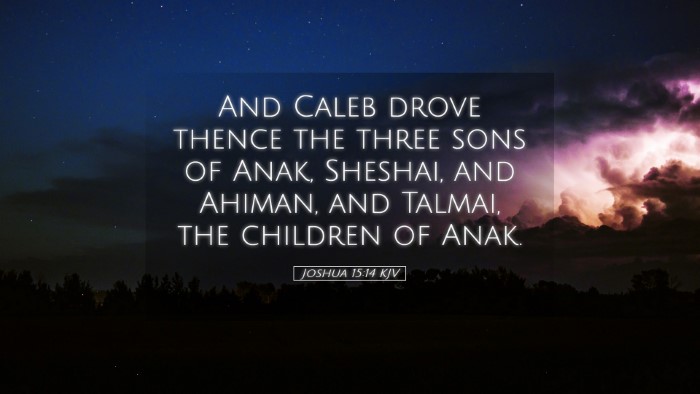Commentary on Joshua 15:14
Joshua 15:14 states, "And Caleb drove out the three sons of Anak from thence, Sheshai, and Ahiman, and Talmai, the children of Anak." This verse captures a pivotal moment in the conquest of Canaan, particularly concerning Caleb, a prominent figure in Israel's history.
Contextual Background
This text arises within the narrative of the Israelites taking possession of the land promised to them by God. After the death of Moses, Joshua leads the people into Canaan, where they are tasked with conquering various nations. Caleb, the son of Jephunneh, stands out as one of the faithful spies sent into Canaan who believed in God's promise despite the daunting challenges.
Exegesis of Joshua 15:14
Caleb's actions in this verse highlight both his faith and authority among the people of Israel. The sons of Anak represent formidable opponents, known for their size and strength. The Anakim were perceived as giants, and their presence struck fear into the hearts of many Israelites. Yet, Caleb, emboldened by a promise from Moses (found in Deuteronomy 1:36), takes it upon himself to confront these giants.
Commentary Insights
-
Matthew Henry Commentary:
Henry notes that Caleb's driving out of the Anakim is not merely a physical act but also a profound act of faith. He underscores that the nature of God's promises equips believers to face their most ferocious challenges. Caleb, fueled by faith, takes on his perceived enemies, indicating that faith is a proactive force that emboldens one to act decisively against adversity.
-
Albert Barnes' Notes:
Barnes emphasizes the significance of Caleb's character as one who does not waver in his faith. He highlights that Caleb’s victory over the giants showcases the principle that true faith often leads to triumphant living, even in the face of great terror. Barnes further elucidates that Caleb, an old man by this time, teaches that God’s promises sustain individuals throughout their lives. His strength is not diminished by age but rather intensified by a lifetime of faith in God.
-
Adam Clarke's Commentary:
Clarke offers a historical perspective on the significance of the Anakim and the fear they invoked among Israel. He interprets Caleb's conquest as a symbolic act of reclaiming the rightful inheritance promised to God's people. Clarke also notes that driving out the Anakim was a fulfillment of prophecy and expressed God's faithfulness. Furthermore, he stresses the importance of personal determination in overcoming spiritual giants in one's life.
Theological Implications
The broader theological themes in Joshua 15:14 present pivotal insights on faith, empowerment, and divine promise. Caleb exemplifies how believers are called to act in faith. He embodies courage, taking on what seems insurmountable by human standards. This act serves as an encouragement for pastors and theologians to view challenges as opportunities for God's power to manifest through human obedience and trust.
Faith in Action
Caleb's decisive action serves as a model for contemporary Christians in their spiritual journeys. His ability to confront giants echoes the biblical call to live by faith, not by sight (2 Corinthians 5:7). The significant takeaway from this passage is reinforcing the belief that empowerment through faith can enable believers to overcome obstacles, no matter how gigantic they may appear.
Concluding Reflections
This verse and the commentary surrounding it encapsulate the essence of a believer's journey. It invites readers to reflect on their faith amidst challenges and the importance of trusting in God's promises. The legacy of Caleb encourages future generations to understand that their battles are not fought alone—they are backed by the covenant power of the Almighty God, as demonstrated in Caleb's brave endeavors against the sons of Anak.


